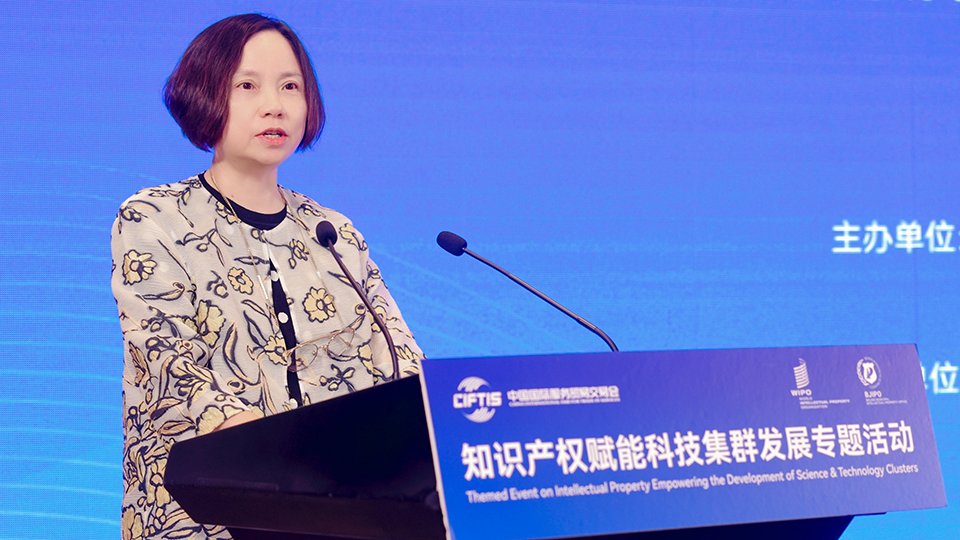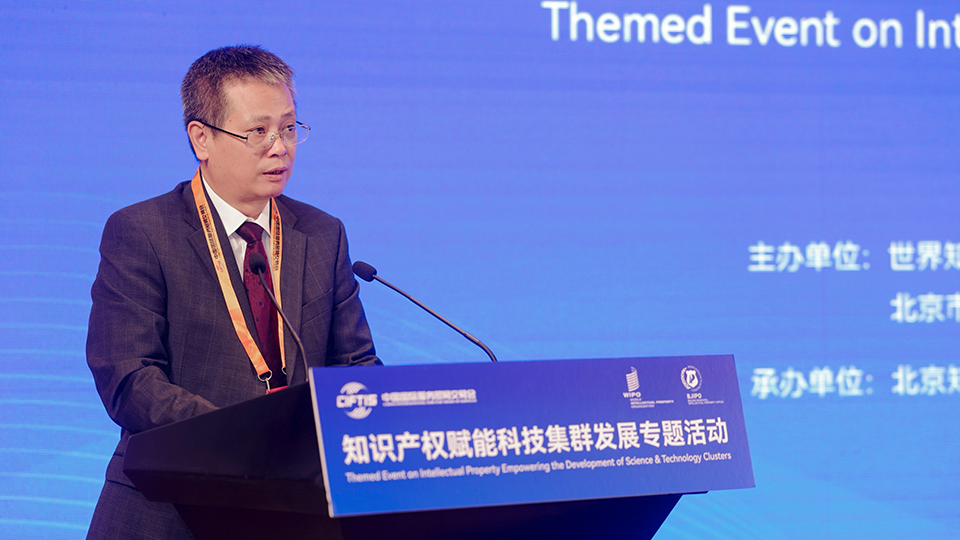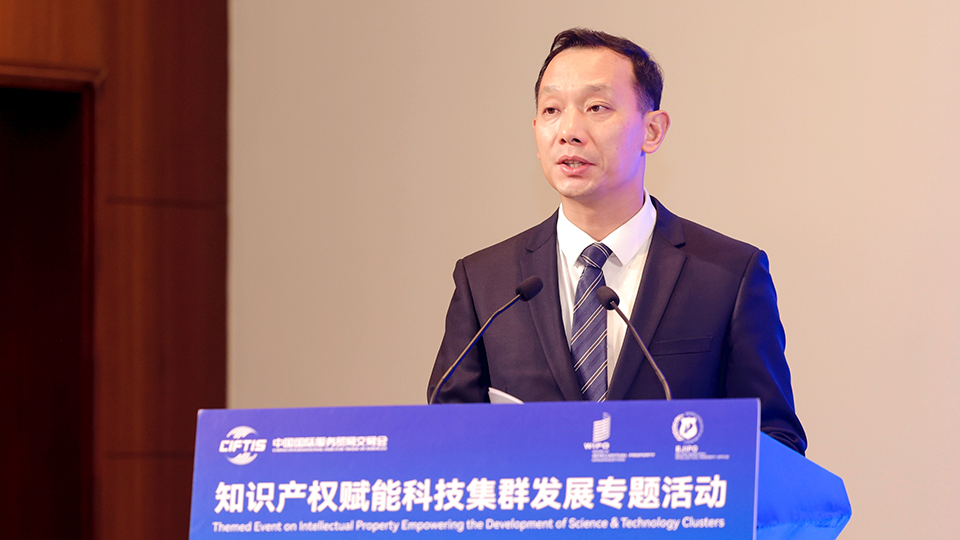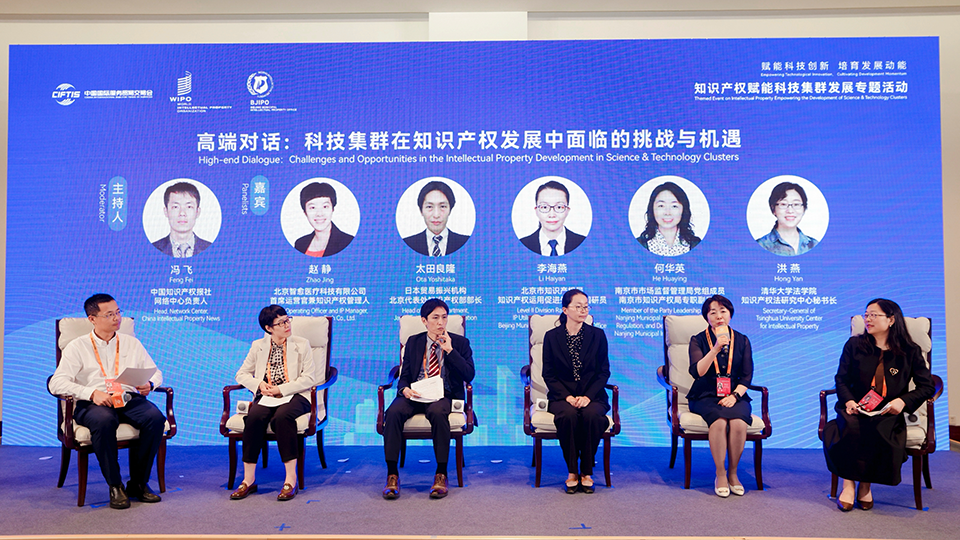WIPO China: Advancing Science & Technology Clusters through IP Innovation | 2024 CIFTIS IP Themed Event
26 de septiembre de 2024
On September 14, 2024, at the China International Fair for Trade in Services (CIFTIS), the WIPO Office in China and the Beijing Municipal Intellectual Property Office co-hosted the Themed Event on Intellectual Property Empowering the Development of Science & Technology Clusters. Keynote addresses were delivered by Ms. Liu Hua, Director of the WIPO Office in China, Mr. Peng Wen, Deputy Director General of Intellectual Property Utilization Promotion Department, China National Intellectual Property Administration (CNIPA), and Mr. Ding Zhangchun, Deputy Secretary-General of the People's Government of Beijing Municipality.

In her address, Ms. Liu Hua emphasized two pivotal innovation waves —the “Digital Age” and “Deep Science” waves—which are transforming profoundly the way we live, work and play. On August 27, 2024, WIPO unveiled the latest edition of Global Innovation Index (GII) ranking for the world’s top 100 science and technology clusters, where China maintained its leadership position with 26 clusters among the top 100 for the second consecutive year. This achievement underscores China and Asia’s growing dominance in global innovation. She further highlighted that over 60% of China’s patent filings and top-tier scientific papers result from international collaborations, demonstrating the vital role of cross-cluster partnerships in fostering knowledge sharing, technology transfer, and building resilient innovation ecosystems.
She further mentioned that, in addition to China having 26 clusters among the world’s top 100 and maintaining its global leadership for a second consecutive year, these clusters include well-established hubs such as Beijing, Shenzhen-Hong Kong-Guangzhou, and Shanghai-Suzhou, as well as emerging innovation cities like Hefei and Zhengzhou. Notably, Beijing climbed one spot from last year, now ranking third globally.
The rapid growth of China's science and technology output, particularly in international patent applications, is evident. Hefei and Zhengzhou saw significant growth rates of 23% and 19% respectively, placing them among the global leaders. The strong showing of China’s S&T clusters reflects the government’s robust support, increased corporate innovation, and active participation of research institutions. The country's consistent rise in innovation capability is a direct result of sustained investments in science and technology, coupled with stronger intellectual property protection. China remains a global leader in applications under the PCT, the Hague system for industrial designs, and the Madrid system for international trademark registration.
Ms. Liu also highlighted WIPO’s series Global Conversation on Frontier Technologies and encouraged Chinese partners to actively participate in these global conversations to pool talent, technology, and networking resources. She reaffirmed WIPO Office in China’s commitment to deeper engagement with new technologies, visionary leaders, and emerging innovation hubs. The office will continue to provide tailored, high-quality services to support China’s innovation-driven development and Beijing’s rise as a global innovation city.

Mr. Peng Wen emphasized the crucial role of intellectual property in the development of S&T clusters and the commercialization of technological achievements. He pointed out that IP is the core driver of transforming innovation results into productive forces. He also shared the latest progress and outcomes from CNIPA’s efforts to promote patent utilization and improve IP protection systems, calling for the enhancement of IP's function, improved efficiency in technology transfer, and strengthened protection measures to further empower S&T clusters.

Mr. Ding Zhangchun highlighted Beijing’s achievements in IP protection and technological innovation, noting the city's efforts to improve its IP protection mechanisms, enhance IP’s role in empowering innovation, and deepen international cooperation in IP. He mentioned Beijing’s active participation in global IP governance, including co-hosting the Third Belt and Road High-level Conference on Intellectual Property with CNIPA and WIPO in Beijing. Additionally, the WIPO-Tsinghua University Joint Master’s Program on Intellectual Property and Innovation Policy recently launched, further supporting technological innovation and cluster development by promoting the transformation of IP into productive forces and creating an open innovation ecosystem with global influence.
The keynote session featured five renowned IP experts, including Dr. Sacha Wunsch-Vincent, Head of Composite Indicator Research Section, Department for Economics & Data Analytics, World Intellectual Property Organization, Co-Editor, Global Innovation Index; Mr. Du Changhui, Vice President, Beijing Intellectual Property Court; Mr. Lv Guoqiang, Officer-in-charge, WIPO Arbitration and Mediation Shanghai Service; Mr. Du Miao, Member of the Procuratorial Committee and Director of the Fourth Procuratorial Department, People's Procuratorate of Beijing Municipality; and Mr. Su Jing, Intellectual Property Affairs Department director of BOE Technology Group Co., Ltd. These experts shared valuable insights into both theoretical research and practical experiences concerning IP's role in empowering S&T clusters.
Dr. Sacha Wunsch-Vincent noted that the rankings of global leading S&T clusters reveal the active role countries play in publishing scientific publications and submitting PCT applications under WIPO’s PCT system, with China demonstrating outstanding performance. Mr. Du Changhui shared the specialized approaches and strategies adopted by the Beijing Intellectual Property Court to support innovation in S&T clusters. Mr. Lv Guoqiang outlined the latest trends and achievements in international intellectual property dispute resolution. Mr. Du Miao introduced how the People's Procuratorate of Beijing Municipality has strengthened high-efficiency criminal prosecution to safeguard the healthy development of the artificial intelligence industry. Mr. Su Jing explained how BOE Technology Group has leveraged its global IP strategy to enhance technological innovation and cooperation.

The High-end Dialogue session focused on the challenges and opportunities for S&T clusters in the field of IP. The dialogue featured five panelists: Ms. Li Haiyan, Level II Division Rank Official, IP Utilization Promotion Division, Beijing Municipal Intellectual Property Office; Ms. He Huaying, Deputy Director-General of Nanjing Municipal Intellectual Property Office; Mr. Ota Yoshitaka, Head of the IP Department, Japan External Trade Organization (JETRO) Beijing Office; Ms. Hong Yan, Secretary-General of Tsinghua University Center for Intellectual Property and Ms. Zhao Jing, Chief Operating Officer and IP Manager, Beijing Healinno Tech Co., Ltd. The panelists shared valuable insights on the current state of S&T clusters, the challenges they face, and the opportunities ahead in IP development.
During the event, several key outcomes in Beijing’s efforts to empower S&T clusters through IP were released. The Signing Ceremony for the Memorandum of Cooperation on Overseas IP Protection and Assistance Public Service Work, the Signing Ceremony for the "Intellectual Property Protection Agreement 2.0 between Beijing Intellectual Property Protection Center and Beijing Arbitration Commission/Beijing International Arbitration Center", the Signing Ceremony for Intellectual Property Operation Cooperation in the Power Battery Sector, the Release of the "Blue Book on Innovation and IP Protection in the Information and Communication Industry (2024)", and the Establishment of the Information and Communication Industry IP Alliance Liquid Cooling Technology Committee have been organized successively.
More than 100 representatives from government, industry associations, enterprises, universities and international organizations attended this event.